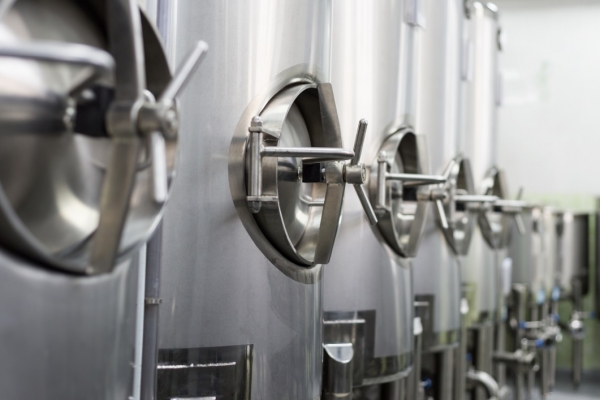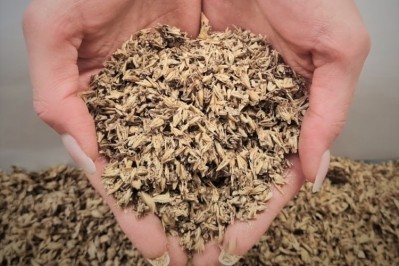From biotech to robotics: FTW Ventures talks food tech in the era of COVID

FTW Ventures has launched a new US$4m fund that it hopes will help build a food system fit for the future. The investment vehicle, which already has significant mark-ups in the likes of bio-designed protein innovator Geltor, is on the lookout for 15-20 companies that would benefit from its mentorship, networking connections and, of course, cash.
“FTW Ventures works tirelessly behind the scenes to support a food system for future generations,” founder Brian Frank – who has himself launched three successful start-ups – explained.
“We see opportunity investing in food and ag tech that has a massive transformative effect on these trillion dollar markets,” he told us.
For Frank, FTW’s investment thesis is about more than generating a certain return within a certain investment window. “It’s not just about making money – it’s making money by doing good.”
Bringing together two ‘complex worlds’
With his tech background – Frank’s own start-ups were focused on areas like mobile and web communications, AI and social media and were sold on to the likes of Twitter and Google – Frank believes that FTW Ventures bridge the gap between food and technology.
Back in 2015, when he sold his last business to Google, Frank reflected that he was ‘sitting in Silicon Valley going what's next for my career’ when he was contacted by a number of VCs who explained they were ‘challenged to understand how companies succeed in two complex worlds, technology and food’.
He then spoke to contacts in the food industry and gained a valuable insight: Operators in the food sector didn’t themselves have much expertise in technology. The ‘food guys’, it transpired, ‘knew how to put the next fizzy beverage on the shelf, but didn't know how to apply AI, machine learning, or advanced automation right into the way to their business models’.
The opportunity was clear. Utilising the latest tech developments in the food space could disrupt the FMCG sector.
Frank also believes that there is still a need to bridge the gap between large corporations and start-ups. While corporations have adjusted their strategies in response to challenger brands, either launching their own investment vehicles or increasing external collaboration, investment firms like FTW still have an important role to play, he suggested.
“The industry is moving to a point where early stage start-up businesses are very valuable to large corporations – and large corporations are actually very valuable to start-ups at the right time, to help them build and scale.”
However, the food tech expert continued, there is one aspect to be mindful of when entering this kind of relationship: ‘giving companies time to evolve’.
“Start-ups are very formative in the early days, they have a lot to figure out. Large corps have different things they can apply – like build to scale. When you are early [stage], you are still working on things like product market fit – that isn’t where corporations excel. Part of it is judging the right time to bring in the right people and building the right support at any given time.”
The investor is an advocate of a wholistic, system-wide approach to solving the challenge faced by the food system, one that examines the most significant pain-points to evaluate what technologies will deliver the greatest impact.
“The food system is large, complex and has a lot of interconnected moving pieces. We look at the entire system and ask 'where can we apply time, energy and money to make the biggest impact?'
“We start with a systematic idea. A good example that has become very popular is sustainable packaging. We seek companies that fit that broad thesis… We try and find the perfect marriage of what the world needs and what start-ups are doing.”
So, what tech advancements does Frank believe offer the most opportunity to shake up the food system for the better?
The rising star of sustainable packaging
Sustainable packaging has shot up the corporate agenda as various regions begin to regulate against single-use plastics – and interest in start-ups delivering unique science-based solutions has skyrocketed as a result, Frank revealed.
“I can't have a call right now with large manufacturers [without discussing] sustainable packaging. When we first started the fund, I didn't have packaging and advanced materials as part of our vision. But every single food manufacturer, every single supply chain partner, everybody has asked me, 'if you see anything in sustainable packaging and compostable biodegradable packaging, we would love to know'.”
For this reason, sustainable packaging now sits alongside FTW’s other areas of interest and Frank believes that there is a huge opportunity for innovators bringing new solutions to the market.
“We are going to get off single use plastics and things that aren't biodegradable,” he predicted. “We're going to go in two different directions. One is in recyclable, reusable components. But we're also going to replace all of our traditional plastics with things that are compostable and biodegradable in the long run. It's now just a race to figure out where that technology is going to come from.”
Bullish on biotech
Elsewhere, Frank suggested developments in the life sciences and biotechnology are poised to completely reinvent how we source materials.
Listing off advances in fermentation, cell culturing, CRISPR/Cas9, genetics and genomics, microbiome and computational biology, he insisted that new understandings of the role biosciences can play in the food industry will help ‘solve major challenges in agriculture, food quality and human health and nutrition’.
Frank calls this ‘biology to the rescue’.
“We believe that biology in general will be the underpinning of a lot of the new food system… Life sciences is a big opportunity in the food industry right now.”

Ag-tech and automation
Developments like the biofermentation of ingredients will support a food system that needs to feed more people using fewer natural resources. There are also gains to be made in more traditional approaches to food production. Frank expects increased adaptation of robotics and automation, particularly at a farm level, will also help improve efficiency in the food chain.
“We love automation, robotics and more hardware making its way to the farm and supply chain,” he said, noting that this is a hot topic right now given structural weaknesses arising from an over-reliance on migrant labour, which have been uncovered by the coronavirus pandemic.
“We believe that there is a whole wave of automation and robotics coming to the farm and supply chain – and now faster than ever because of COVID.
"The door is open for automation and robotics to solve challenges in agriculture and manufacturing food, when we can't have the same role of labour in the market anymore and people want secure, safe, consistent food."
This transformation, he suggested, will be something akin to the shake-up that the automotive industry underwent when Henry Ford introduced the assembly line.
This is not to say the path to on-farm automation is an easy one. With farmers typically highly-leveraged and operating on tight margins, sizeable investments in farm equiptment and ag-tech are a big ask. But Frank does not believe this problem is insurmountable and already he sees the development of new financing solutions taking inspiration from the world of fin-tech.
“We are seeing these new innovative approaches to financing. This is where the technology sector needs to rush in.”
Consumer tech and novel products
Frank sees similarly impactful innovations for a more sustainable food system looking to the consumption side of the equation. The rise and rise of plant-based protein is an obvious case in point. He attributes this megatrend to having the right product, in the right place, at the right time.
“People were ready to diversify their diets. They were happy with animal protein but wanted to get more veggies in their diets. Companies like Impossible Foods, Beyond Meat and Just had product at the right time and the right mindset of the consumer.”

Does this mean the plant-based market could now be nearing saturation point, particularly given the more nuanced discussion that is emerging about the health halo and perceived ‘naturalness’ of analogue products?
Frank responded: “You touched on all the arguments we have here every single day at FTW. We've been trying to figure that out. If you look at it from the basest perspective, is everybody in the world become going to become a vegan and vegetarian? No. People are still going to eat meat. So the question becomes how much of a bite does plant based foods take out of traditional meat, proteins, and meat products.”
Frank thinks that the global opportunity – in markets like China and India that have a large vegetarian population, but also in emerging markets for plant-based like Brazil – leaves headroom for growth. “For the short term, it's definitely going to keep growing. There's more market opportunity than they can supply at this point.”
Outside plant-based, Frank has taken note of a number of other trends that are poised to challenge established consumption patterns. These range from e-commerce and direct-to-consumer, to clean label ingredients and personalised nutrition, all of which have seen a big COVID boost.
SaaS services, AI and machine learning
Personalised nutrition is a great example of what can be achieved at the interface of cutting edge-tech and consumer need-states.
“We talk about understanding how our body processes food and then identifying the foodstuffs or sources that are best fit for either your medical necessity or your life goals. One of the areas that we think is a huge growth opportunity is people that need to solve a key medical challenge are going to have the technology and services to help them identify the foods that are best for them… We're starting to see new companies being built just around the services to do that.”
This opportunity is one that is unlocked by our evolving understanding of the interconnected nature of diet and health, the development of new functional ingredients, and a vastly improved capacity to collect, analyse and interpret data thanks to AI and machine learning.
But this is far from the only way AI can be applied to the food industry. “We're really excited about AI and machine learning as applied to the food system,” Frank enthused.
Across the supply chain, AI can be leveraged to improve multiple functions, from demand planning through to predicting disruption from events like extreme weather patterns in agriculture.
“We believe AI machine learning will actually help us predict and plan better in all of these channels. So we use our resources efficiently and so we waste less food.”


























